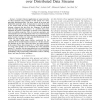Free Online Productivity Tools
i2Speak
i2Symbol
i2OCR
iTex2Img
iWeb2Print
iWeb2Shot
i2Type
iPdf2Split
iPdf2Merge
i2Bopomofo
i2Arabic
i2Style
i2Image
i2PDF
iLatex2Rtf
Sci2ools
101
click to vote
ICDE
2010
IEEE
2010
IEEE
Global Iceberg Detection over Distributed Data Streams
In today's Internet applications or sensor networks we often encounter large amounts of data spread over many physically distributed nodes. The sheer volume of the data and bandwidth constraints make it impractical to send all the data to one central node for query processing. Finding distributed icebergs--elements that may have low frequency at individual nodes but high aggregate frequency--is a problem that arises commonly in practice. In this paper we present a novel algorithm with two notable properties. First, its accuracy guarantee and communication cost are independent of the way in which element counts (for both icebergs and non-icebergs) are split amongst the nodes. Second, it works even when each distributed data set is a stream (i.e., one pass data access only). Our algorithm builds upon sketches constructed for the estimation of the second frequency moment (F2) of data streams. The intuition of our idea is that when there are global icebergs in the union of these data ...
Related Content
| Added | 20 Dec 2009 |
| Updated | 03 Jan 2010 |
| Type | Conference |
| Year | 2010 |
| Where | ICDE |
| Authors | Ashwin Lall, Haiquan (Chuck) Zhao, Jun Xu, Mitsunori Ogihara |
Comments (0)

